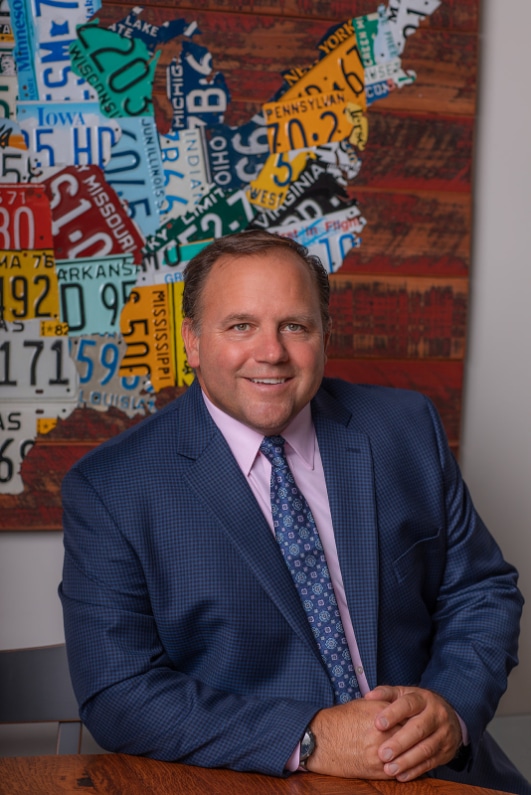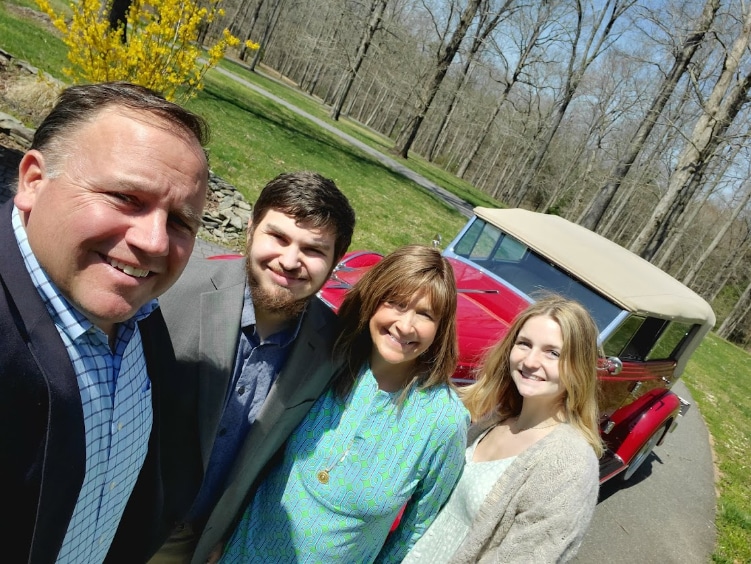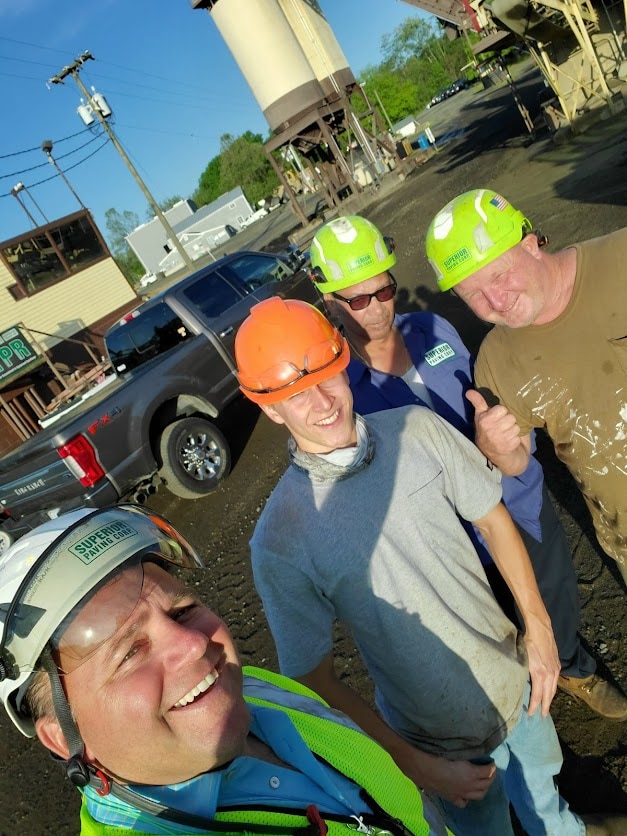Meet NAPA’s Incoming Chairman James A. Mitchell
BY AsphaltPro Staff

The AsphaltPro staff continues the tradition of introducing the incoming chairman of the National Asphalt Pavement Association (NAPA) with 2022 Chairman James (Jim) A. Mitchell.
In 1976, Bob Surface, Bart Mitchell and Ron White founded Superior Paving Corp., then headquartered in a Luck Stone
Company scale house in Centreville, Virginia, and enrolled the company in NAPA. Now Superior Paving Corp., headquartered in Gainesville, has 10 asphalt plants and 12 locations throughout Northern Virginia and executive team member James A. Mitchell is taking the reins at NAPA as the 2022 chairman. He brings a degree in Business Management from Lynchburg College to not only his responsibilities at Superior, but also to the role of NAPA chairman.
Before he takes the stage at the NAPA annual meeting in Scottsdale, Arizona, Jan. 24, to address the membership, Mitchell took the time to share some thoughts with the industry at large.
How long have you, personally, worked in the asphalt industry?
Since my first summer in 1984 at the age of 15
Could you share with readers your immediate family?
Jill Mitchell (Wife), Charlie Mitchell (21), Samantha Mitchell (20)

The Mitchell family
What volunteer work do you participate in that you would encourage others to consider and why?
Community service is a core expectation in my life. To whom much is given, much is expected. In college our fraternity would often help split firewood and deliver it to people in need. I have continued those efforts with my family in our town today.
As an adult, my wife and I spent 15 years on the board of our local homeless shelter. My wife and I have also started our own foundation to ensure that our family will continue to support the causes and institutions that have been meaningful in our lives. Certainly, Superior is constantly focused on supporting the communities where we live and work.
What other hobbies can you share with us?
Jill and I love to travel. I am also a car enthusiast, and I am blessed to have a wife who is fully supportive of this habit as well.
A book Mitchell has found influential and that he would recommend to other is Charles Duhigg’s “The Power of Habit.” He said, “This book helped me better understand why people behave the way they do. More importantly it helped me better understand my own habits. This understanding has helped my work on my own self-discipline and self-awareness.”
How/why did you join the asphalt industry?
Our family has been self-employed going back to the beginning of the 20th century. My great grandfather was a butcher. My grandfather started us in the asphalt business in 1941. My father was one of the founders in the partnership that is Superior Paving in 1976. I have always enjoyed the people in our industry. Of course, that was limited to those at our company until I got a little older. Over time and right up to today, I feel blessed to work in an industry that is full of great people.
What does membership in NAPA and the Virginia Asphalt Association mean to you personally?
Associations are essential to any industry. In good times, we get to enjoy each other’s company and learn about best practices to make our product as competitive as possible. In more difficult times, we need our associations to represent us properly in Washington and locally. We need to be a part of the conversation when regulations, specifications and funding are being discussed.
Could you give an example (or two) of a way VAA assists its members with workforce development?
VAA has been assisting with workforce development in several ways. The first was the establishment of VECAT in 2015. VECAT is the Virginia Education Center for Asphalt Technology. Through VECAT, employers can send employees to school in the community college system to earn a certificate or associates degree.
Just recently, VAA and related construction associations have partnered with the Virginia Community College System to obtain dedicated funding for an Infrastructure Academy. The Academy will be focused on attracting and training a new workforce to support the infrastructure development, construction, rehabilitation and maintenance needs in Virginia.
For the past 25 years, all but a handful of major transportation construction projects have been completed with asphalt pavement. With having the third largest state-maintained transportation network, there is constant awareness that the concrete industry would like to increase their market share. We need to be very mindful of the private markets such as parking lots and industrial facilities. Some of those projects we self-perform, others are completed by FOB customers. As our economy continues to recover and expand, we cannot lose sight of that marketplace for asphalt.

James Mitchell and crew members at a Superior Paving plant location
In recent months, what are the top two or three positions for which Superior Paving Corp. has had the most difficulty finding quality workers?
This past year it has been challenging to recruit qualified applicants and even more difficult finding skilled laborers and equipment operators—paver, screed and CDL drivers.
This opportunity led us to increase our focus on retention and engagement of our current workforce through monthly on-site visits with our plants and paving crews, improved cross-training opportunities and bonus incentives.
Could you give an example (or two) of a way Superior Paving Corp. works with area employment agencies or workforce development agencies to encourage interest in asphalt as a career choice?
Superior engages with the Virginia Workforce Connection as well as Workforce Development Offices in Loudoun and Fauquier counties by routinely providing our current employment opportunities. We also provide presentations that emphasize Superior’s Values Based culture, Safety Is For Life, competitive pay and benefits, and world class technical and developmental training opportunities.
We collaborate with institutions to demonstrate the focus on technology and sustainable resources in the asphalt industry. In addition to practical or hands-on experiences, leveraging social media and virtual reality experiences could be of great benefit in reaching the next generation.
What is your favorite method for recruiting new asphalt professionals to the industry in general?
Superior’s preferred and most successful method of recruiting is our employee referrals. Our employees live our values and understand the job and work environment. They are able to effectively provide an accurate description, set expectations and promote participation in Superior’s culture.
Could you share with readers how your education encouraged or fed your interest in the asphalt industry? And how do you believe we can help today’s educational institutions improve the messaging about a career in our industry?
I have always been oriented toward the asphalt industry. It is all I knew growing up. My father was gone before I woke up and often not home for dinner. I learned from this how hard you need to work to be successful. I did not begin to enjoy or appreciate my education until I got to college. It was there that all of the conversations about work and summers on a paving crew came together. A business education and the fundamentals of a work ethic, got me off to a good start as I began to work full time at Superior.
I know that our industry has a lot to offer, but that began with encouragement from my father. We have a great team that makes our company function each day. They all have their own story about how they came into our industry. Those are the stories we need to tell. We need to expand the opportunities to introduce our industry to the next generation. Additionally, we need to tell our current story to those with an outdated perception of our industry.
Most of the work force does not know what it is like to run a plant, work in a lab or be a project manager. These are rewarding and well-paying jobs with lots of responsibility. They require technical knowledge but not necessarily a college education. They also require an instinctive ability to work with technology, which all young men and women have and could easily use to find success in our industry. They just need to be encouraged to explore our industry.

James and Jill Mitchell
What threats to the asphalt industry do you plan to guard against during your year as chairman?
First and foremost, as you probably guessed, is infrastructure funding. At the time of this interview, we’re still waiting for Congress and the administration to agree on long-term funding. All of us have seen over the last couple of years how vital it remains to commerce and even to creating a sense of community. We in the industry have unique insight into the design and maintenance of our incredible but aging highway system. We need government to step up, and when they do, we’ll be ready in NAPA leadership and though NAPA’s expert staff to support members with guidance on the legislation, best practices for workforce development and project delivery, and ongoing research to provide the best paving products and services for the American people.
Second, safety is always on our minds, and it really goes hand in hand with a potential expansion of projects nationwide. NAPA advocated for additional safety funds in national legislation and we continue calling for ongoing advocacy and education through WatchForUs, CrewSafety, and our events and publications. The NAPA Research and Education Foundation last year increased the NAPA Care benefit for when workers are killed in the line of duty. But as an industry and as motorists ourselves, we must strive every day to bring that number to zero.
Finally, the industry is launching a Climate Action Plan in 2022 that will guide us to reduce the industry’s carbon footprint over the next few decades. Many will see this as an extreme challenge, but I propose that it’s an incredible opportunity to advance our people, product, and processes. With imagination, science and commitment, we can have a measurable impact on where this industry is headed, and how that affects the communities we call home.
We have many such opportunities at NAPA and across the industry, and the timing aligns with our forthcoming strategic planning. I invite my peers to get engaged so they can shape not just the future of their companies, but also the future of the industry.
As you take on the travel and engagements of a NAPA chairman, who will assist with your many responsibilities back at Superior?
There are not enough pages in this magazine for me to express how awesome and capable our team is back in Virginia. Every challenging situation is an opportunity for someone to step up and show leadership. In early 2020, we had begun to shift some responsibilities around in anticipation of my opportunity to represent our industry as Chairman on NAPA. March 16, 2020, was the day we all came to work to figure out what COVID was and how we were going to manage through it. Our team, all 325 of them, accepted this challenge. I cannot be more proud of them. Their willingness to react and respond was and continues to be amazing. While our executive team had to figure what needed to be done to maintain a safe work environment, everyone else had to figure out how to continue to meet the needs of our customers. These past 18 months have clearly shown that Superior will continue to thrive in my absence.
What do you see as the most important part of your job as the 2022 chairman for NAPA?
There are three things that I believe will be important this coming year. First is to learn how NAPA can continue to meet the needs of its members and our industry. Second is to communicate that NAPA has adopted a new governance structure that will increase the engagement of our memberships and allow NAPA to grow its partnership with our industry on more regional basis. Finally, to support our NAPA team and their hard work as they execute NAPA’s mission.
NAPA’S MISSION
The National Asphalt Pavement Association (NAPA) works to support, advocate and advance the asphalt pavement industry.
- We support our members through education, technical advice, recognition programs and peer engagement.
- We advocate by engaging, collaborating with and educating decisionmakers.
- We advance the industry through innovation and research, thought leadership, and promoting safe, efficient, sustainable operations.
